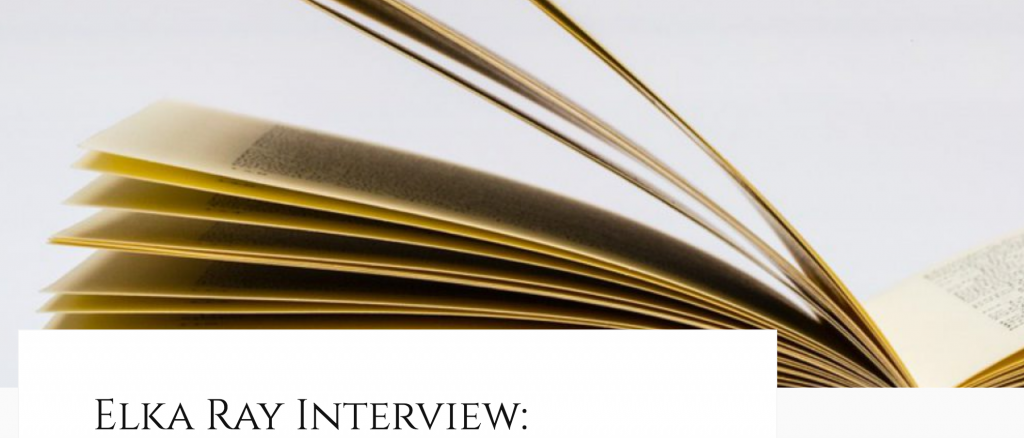Elka talks writing across genres with The Dorset Book Detective
Elka Ray, a crime author who also writes children’s books and short stories, discusses these three varied mediums and the benefits of each.

Tell me about how you came to define your writing style. What drew you towards crime fiction and mystery writing?
I’m fascinated by what motivates people, especially when their actions seem illogical. Crime stories revolve around the motive. It’s not enough to discover who did it. I want to know why they did it. In every story I’m exploring the emotions that drive people towards crimes and moral failures.
What is your background and how did you get in to writing professionally? How do you draw on your past when writing fiction?
I studied Journalism and spent years doing media and communications work. Many of my stories are set in places I’ve visited for work.
Please tell me about your books. Why do you believe they have become so popular?
My first novel, Hanoi Jane, is a light romantic mystery about a young American reporter who becomes obsessed with digging up dirt on her ex-fiancé’s seemingly perfect new girlfriend. Jane starts out tragically stuck in the past but ends up on a life-changing adventure in Vietnam. I think the story resonates with readers because anyone who’s ever felt heartbroken, humiliated or a bit lost can relate to Jane. And who hasn’t, at some point in their life?
As the title suggests, my next book, What You Don’t Know: Tales of Obsession, Mystery & Murder in Southeast Asia, is much darker. Set in Thailand, Cambodia, Indonesia, Vietnam and Singapore, these ten short stories follow people committing nasty deeds motivated by jealousy, greed, fear and revenge. The stories range from macabre to blackly humorous. The book’s getting great reviews from readers who enjoy crime stories and traveling- my twin passions!
My latest book, Saigon Dark, just came out in mid-November 2016 and tells the story of a young divorced mother, Lily Vo, who steals an abused child after the sudden death of her own daughter. While taking a child is obviously wrong, rescuing one might be justifiable. But this decision, which Lily has to cover up, comes back to haunt her. So far the book’s doing well and I think that’s because – flawed as she is – readers can identify with Lily and her predicament. There are some heartbreaking moments but overall the book’s not depressing. Lily’s a strong woman who prevails, although at a cost.
Tell me about writing books for children. How do you amend the writing style to suit your audience?
I write and illustrate very simple kids’ books about the culture and landscape of Vietnam (www.stickyriceworld.com), where I live with my husband and children. The big challenge with picture books is conveying your message in 500 words or less. I think all writing – whether you’re aiming at toddlers or adults – should be as clear as possible.
How do you adapt your writing style when composing short stories? Do you find the word limit restrictive or freeing?
Novels are like giant jigsaw puzzles. Where should the bits go? Deciding where to place scenes or drop vital clues can be confusing. With a novel, it’s sometimes hard to remember what you’ve revealed. Did I already tell the readers that? Will they remember from way back in Chapter 2? There’s a fine line between leaving readers confused and being repetitive.
Short stories are fun to write. I enjoy that tight focus and the relatively quick reveal. Now and then we all deserve some instant gratification.
Where do you find your inspiration? Are there any particular places or incidents you draw on when you find yourself with writer’s block?
I’ve never had writer’s block. If anything, I have too many story ideas and feel frustrated that I don’t have time to pursue everything.
I live near the ocean and spend an hour or so every day playing in the waves or swimming. Most new story ideas, characters’ voices and plot twists come to me in the ocean.
If you could collaborate with anyone, living or dead, on a writing project, who would it be and why?
An American writer named Scott Smith published a book called A Simple Plan in 2006. It’s one of the most suspenseful books I’ve ever read. Since then, he’s published one other novel, The Ruins, which I’ve been unable to find! (I live overseas and it’s not on Kindle.)
While I wouldn’t have the confidence to collaborate, I’d love to track Scott Smith down, get a writing lesson and beg him to write more thrillers.
Do you have any projects coming up that you are particularly excited about?
I’m illustrating a kids’ story about a magical book that’s aimed at an international audience. It’s a new style for me and I’m both enjoying the process – and nerve-wracked.
A couple new suspense novel ideas are also rattling around in my head. Scenes sometimes come to me in the middle of the night, when I can’t sleep. I tell my husband my latest plot twists in the morning and he always says: “No wonder you can’t sleep! I’m scared to even sleep next to you!”
Are there any new books or writers that you are looking forward to later in the year?
I’m always hoping for new books by Donna Tartt, Tana French, Harriet Lane and Belinda Bauer.
Is there anything you’d like to add?
I’m very pleased to have discovered your blog and will soon be reading my way through books by your chosen Ten Top Women Crime Writers.
Many thanks to Elka for speaking with me- it’s great to hear about your work and its lovely to hear you’re a fan of the blog. You can read more about Elka’s work HERE.
reposted from the Dorset Book Detective
